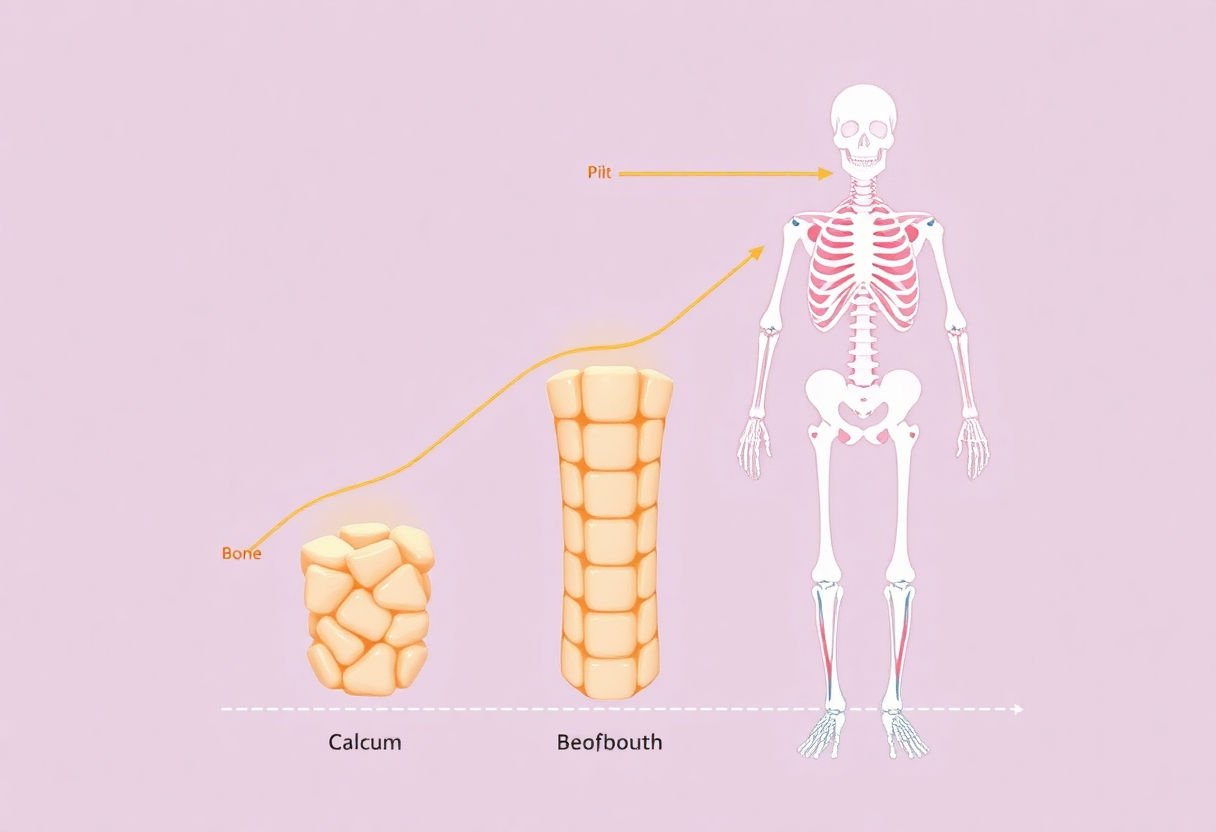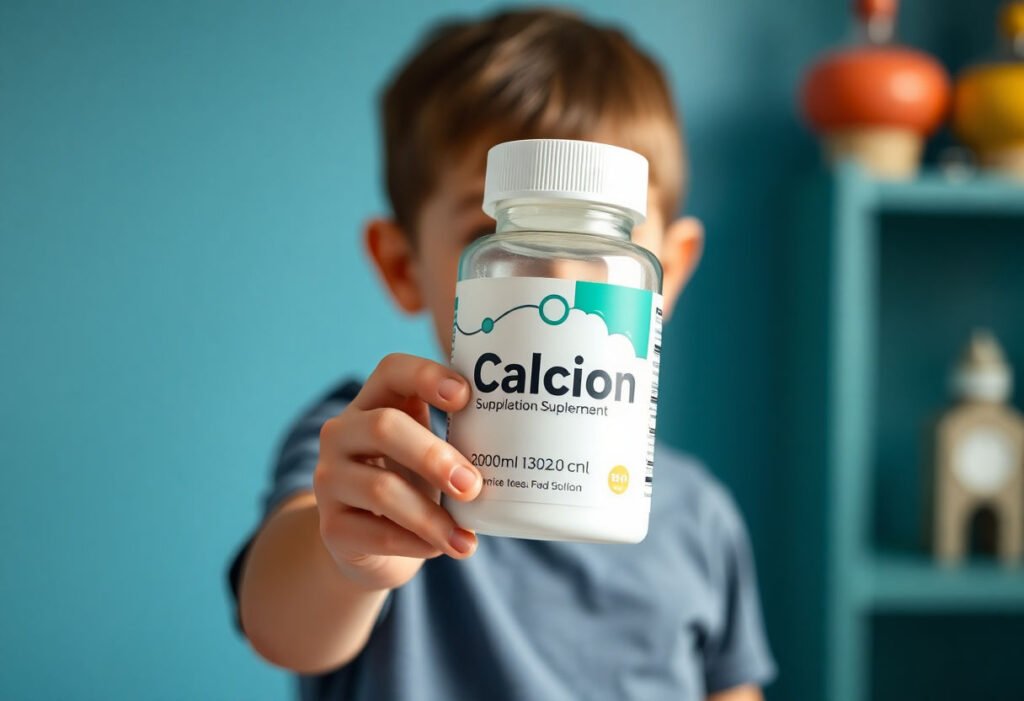Calcium is an essential mineral vital for children’s growth and development, particularly in building strong bones and teeth. In fast-growing years, ensuring adequate calcium intake is crucial to support a developing body. However, diet alone often falls short. Calcium supplements can offer a reliable solution, bridging this nutritional gap. Throughout this article, we will explore the role of calcium in children’s growth, the types and benefits of supplements, and the importance of integrating them safely with dietary habits. By understanding these aspects, parents can make informed decisions to propel their child’s healthy growth.
Key Takeaways
- Calcium supplements play a crucial role in supporting children’s bone development and overall growth.
- It’s essential to choose the right type of calcium supplement that fits your child’s dietary needs and lifestyle.
- While supplements can provide significant benefits, excessive intake poses risks that require careful monitoring.
- Integrating calcium supplements with a balanced diet enhances their effectiveness and promotes optimal health in children.
- Consulting with a pediatrician ensures a safe and beneficial supplementation strategy tailored to individual needs.
The Role of Calcium in Children’s Growth

Calcium is undeniably pivotal in a child’s growth and development. As the primary building block for bones, calcium is essential for establishing a strong skeletal structure. During childhood, when bone growth is at its peak, ensuring that children receive adequate calcium can significantly influence their bone health and capacity for growth.
Bones act as a reservoir for calcium in the body. During periods of growth, the demand for calcium surges as it is continuously deposited to build denser, longer bones. This mineral not only fortifies the bones but also plays an integral role in the formation and maintenance of teeth. Inadequate calcium intake during these formative years can lead to suboptimal growth, potentially resulting in conditions such as osteopenia or, in severe cases, rickets.
Additionally, calcium is crucial for other bodily functions that support growth. It facilitates effective muscle contraction, neuro-transmission, and hormone secretion—each key processes in developing a child’s body. For instance, calcium aids in the transmission of electrical impulses within the nervous system, which is essential for muscle control and coordination.
The demands for calcium increase as children approach puberty, a time characterized by rapid growth spurts. Meeting these increased needs through diet alone can sometimes be challenging, which is why calcium supplements may play a critical role. It’s vital for parents and caregivers to monitor their child’s calcium intake and seek adjustments as needed to support healthy growth.
Incorporating recommended daily calcium intake into a child’s routine ensures that they are on a path to achieving their maximum growth potential and developing a robust physique that will serve them well into adulthood.
Understanding Calcium Supplements

Calcium supplements are a pivotal tool in enhancing a child’s growth process, especially in cases where dietary intake might fall short. It’s essential to understand the various types of calcium supplements available and how each may benefit your child.
Types of Calcium Supplements
Primarily, calcium supplements are available in two forms: calcium carbonate and calcium citrate. Calcium carbonate is the most common and cost-effective, providing a high concentration of elemental calcium. It’s best absorbed when taken with food. Alternatively, calcium citrate does not require food for absorption and is particularly advisable for children with digestive issues or those on antacid medications.
Benefits of Different Forms
- Calcium Carbonate: Offers a high calcium yield per dose, making it efficient for increasing calcium intake. Its affordability makes it a popular choice among parents.
- Calcium Citrate: Although it contains less elemental calcium, it is more easily absorbed by the body. This form is preferable for children with reduced stomach acid.
Understanding Dosages
Ensuring the correct dosage is crucial to obtaining the benefits without risks. The recommended dietary allowance (RDA) for calcium varies by age. For instance, children aged 4-8 years need 1,000 mg daily, while those aged 9-18 years require 1,300 mg.
Consider Potential Additives
When selecting a calcium supplement, it’s wise to consider formulations that include vitamin D — a nutrient that enhances calcium absorption and bone health. Additionally, examining the product for filler substances and allergens ensures the supplement’s safety and efficacy for your child.
By understanding these nuances, parents can ensure their children benefit maximally from calcium supplements, contributing to healthy bone growth and overall development.
Benefits of Calcium Supplements for Children
Calcium supplements offer numerous advantages for children, primarily by supporting their rapid growth phases. One of the most critical benefits is their role in enhancing bone density and strength. During childhood, bones are constantly developing, and adequate calcium intake ensures they grow strong and healthy, reducing the risk of fractures.
Moreover, calcium is crucial for developing healthy teeth. It aids in the formation of tooth enamel, which serves as a protective layer against decay from bacteria and acids in the mouth. Regular calcium supplementation can help prevent cavities and preserve oral health from a young age.
Calcium also plays a vital part in muscle function. It is involved in the contraction and relaxation of muscles, which is essential for physical activities and overall physical development in children. Ensuring sufficient calcium levels is particularly vital for active children engaged in sports and exercise.
In addition to physical benefits, calcium is vital for nerve function. Calcium ions are necessary for the transmission of nerve impulses. This function helps in coordinating and controlling bodily movements and can enhance cognitive skills and learning abilities, contributing to a child’s academic performance.
Additionally, calcium is linked to maintaining a healthy cardiovascular system. It is involved in regulating heart rhythms and ensuring that blood clots effectively in case of injury. Adequate calcium intake can help prevent cardiovascular issues later in life, laying the foundation for a healthy future.
By addressing these aspects, calcium supplements serve as a valuable tool in promoting holistic growth and development in children during their formative years.
Potential Risks and Precautions
Taking calcium supplements can offer numerous benefits for your child’s growth and development, but it is crucial to be aware of potential risks associated with their misuse. Excessive calcium intake can lead to several health complications. Hypercalcemia, characterized by abnormally high levels of calcium in the blood, can occur, leading to kidney stones, impaired absorption of other essential minerals, and even interference with normal heart and brain functions.
To mitigate these risks, it is essential to adhere to the Recommended Dietary Allowance (RDA) for calcium. The RDA varies by age, with children aged 1-3 years requiring 700 mg per day and those aged 4-8 years needing 1,000 mg per day. Consult a pediatrician to ensure that your child receives the appropriate dosage tailored to their dietary needs and health profile.
Moreover, consider the form of calcium being administered. Some supplements, such as calcium carbonate, require food for optimal absorption, whereas others, like calcium citrate, do not. It’s advisable to administer smaller doses, not exceeding 500 mg at a time, to enhance absorption efficiency.
Parents should also remain cognizant of potential interactions with medications when administering calcium supplements. Certain antibiotics can reduce the effectiveness of calcium absorption. Therefore, spacing out the intake of calcium and medications may be necessary to ensure optimal efficacy of each.
By following these precautions and recommendations, parents can safely incorporate calcium supplements into their child’s regimen, supporting healthy growth while minimizing associated risks.
Choosing the Right Supplement

When selecting a calcium supplement for your child, it’s essential to consider several key factors to ensure both effectiveness and safety. First, assess the age-appropriate dosage required, as children have varying calcium needs at different stages of growth. For toddlers aged 1-3 years, the recommended daily intake is about 700 mg, whereas children aged 4-8 years need approximately 1,000 mg.
The form of the calcium supplement is also crucial. Calcium carbonate and calcium citrate are the most common forms. Calcium carbonate is often preferred for its higher elemental calcium content, but it requires sufficient stomach acid for absorption, typically taken with meals. Calcium citrate, on the other hand, is more easily absorbed and can be taken with or without food, making it suitable for children with sensitive stomachs.
Flavor and palatability play a significant role, especially with children. Choose supplements that come in kid-friendly formats such as chewables or gummies, keeping in mind the importance of avoiding excess sugar intake.
Additionally, reading the label is vital to ensure the supplement does not contain harmful additives or allergens. Check for certifications that indicate the product has been independently tested for quality.
Lastly, consider combo supplements that include vitamin D, which aids in calcium absorption. However, consult your child’s pediatrician to tailor the supplement choice to your child’s specific health needs and to avoid any potential interactions with existing medications.
Incorporating Calcium with Diet

Integrating calcium supplements with a balanced diet is essential to maximize their benefits and support your child’s growth effectively. While supplements can provide a concentrated source of calcium, it is crucial to ensure they complement a diet rich in natural calcium sources.
To begin with, encourage the intake of dairy products such as milk, cheese, and yogurt, which are excellent sources of natural calcium. Additionally, leafy green vegetables like spinach and kale, along with fortified foods such as certain cereals and orange juice, contribute significantly to daily calcium needs.
Meal planning is an effective strategy to incorporate calcium naturally. For instance, opt for meals that pair calcium-rich foods with those that enhance absorption. Foods high in vitamin D, such as fatty fish or eggs, can improve calcium absorption and should be included in meals wherever possible.
When it comes to supplements, choose those that align with your child’s dietary habits and nutritional requirements. Consider options like chewable tablets or powders that can seamlessly integrate into their daily routine without disrupting meal times.
Remember, balance is key. While focusing on calcium, do not overlook other nutrients essential for overall growth, such as proteins, vitamins, and trace minerals. Maintaining a diverse diet ensures holistic development.
Moreover, hydration plays a pivotal role in nutrient absorption, including calcium. Encourage your child to drink adequate water throughout the day.
By thoughtfully combining calcium supplements with a nutrient-rich diet, you can help fortify your child’s growth foundation, ensuring they reach their full potential in development both physically and mentally.
When to Consult a Pediatrician

Parents should be vigilant when considering calcium supplements for their children, as there are instances where consulting a pediatrician is imperative. Whenever there is uncertainty about the correct dosage or supplement type, a pediatrician’s guidance ensures that the intake is both safe and beneficial. Children with underlying health conditions, such as kidney disorders or parathyroid gland issues, may require specific medical advice to avoid complications related to calcium supplementation.
Pediatricians play a crucial role in assessing whether a child truly needs calcium supplements since not all dietary deficiencies require supplementation. They can conduct assessments and potentially recommend blood tests if there are concerns about nutritional imbalances. Furthermore, if a child displays symptoms of calcium deficiency—such as delayed growth, muscle cramps, or dental issues—a pediatrician’s evaluation is essential to rule out other underlying health conditions.
In situations where a child is already consuming fortified foods and might risk overconsumption, a pediatrician can help balance dietary intake with calcium supplementation to prevent hypercalcemia, a condition resulting from too much calcium in the blood. Regular follow-ups are beneficial for monitoring the child’s development and adjusting supplement intake as necessary.
Lastly, during periods of rapid growth or major dietary changes, such consultation becomes even more crucial. A pediatrician can offer insights tailored to the unique nutritional demands of each growth stage, ensuring that supplements are used effectively to bolster the child’s developmental needs without side effects.
Conclusion
In conclusion, calcium supplements play a vital role in ensuring that children achieve optimal bone development and overall growth. They offer considerable benefits when chosen carefully and integrated with a balanced diet. As future research advances, the potential for enhanced formulations promises even greater support for children’s health. Parents are encouraged to consult with pediatricians to tailor supplement choices to their child’s specific needs, ensuring both safety and efficacy. By taking informed steps, caregivers can significantly contribute to the robust development and lifelong well-being of their children.
Frequently Asked Questions
What is the optimal age to start calcium supplements for my child?
Calcium supplements can be beneficial at any stage of a child’s growth when dietary intake is insufficient. However, it is crucial to consult with a pediatrician to determine an appropriate age based on individual dietary needs and growth stages.
Are there any side effects associated with calcium supplements?
While generally safe, excessive intake of calcium supplements can lead to constipation or kidney stones. Monitoring the dosage and seeking medical advice is advisable to mitigate these risks.
How can I ensure my child is getting enough calcium if they are lactose intolerant?
For children with lactose intolerance, consider calcium-fortified foods or plant-based milk alternatives, alongside supplements, to maintain adequate calcium levels. Consulting with a nutritionist can also help design an appropriate diet plan.
Do calcium supplements interact with other medications my child is taking?
Calcium supplements can potentially interact with certain medications, such as antibiotics or antacids, which might affect absorption rates. It is essential to discuss any current medications with a pediatrician before starting calcium supplements.
How do I choose between different types of calcium supplements available in the market?
Selecting a calcium supplement depends on factors like absorption rate, convenience, and flavor preferences. Look for supplements with added vitamin D, as it enhances calcium absorption, and consult with your child’s healthcare provider to make an informed decision.


